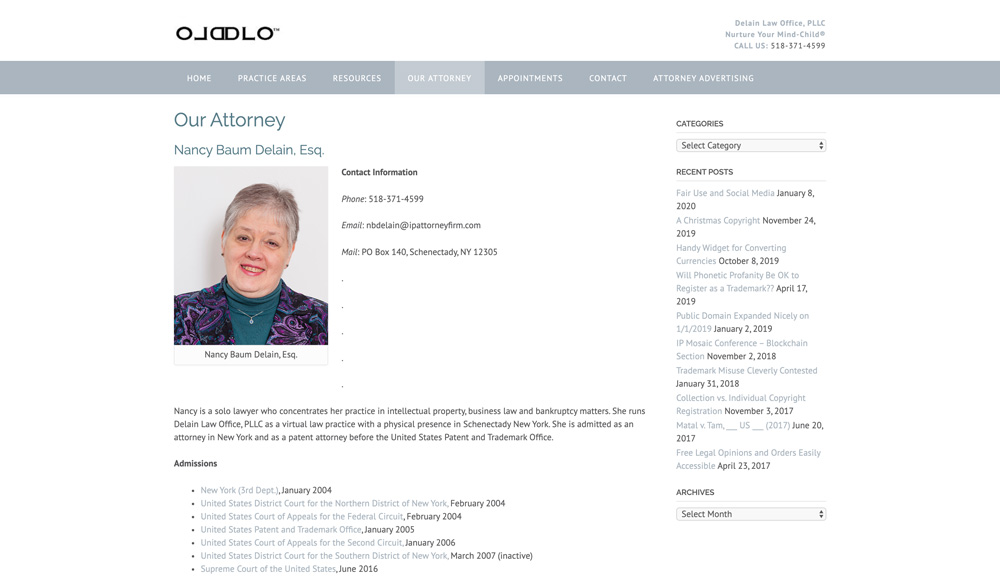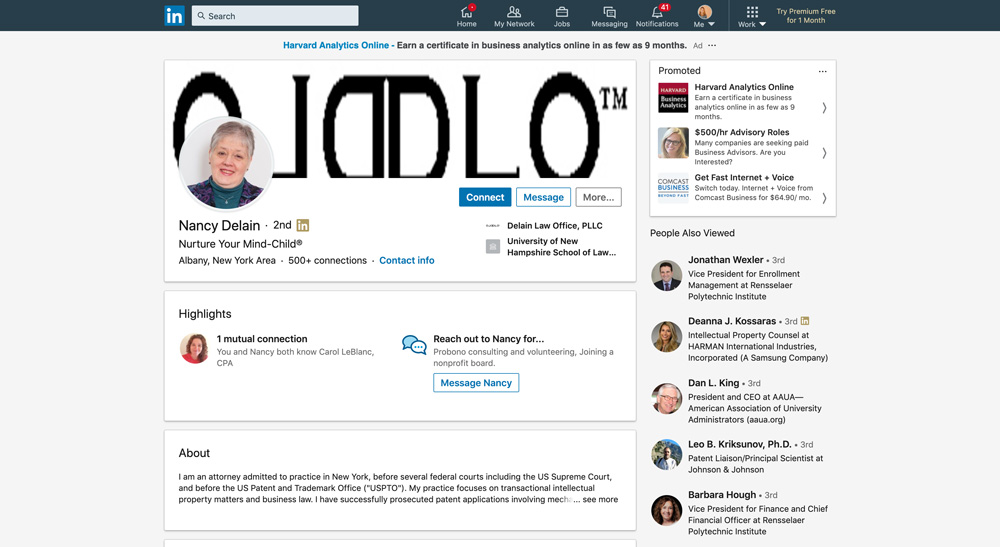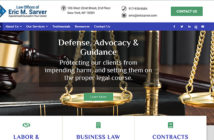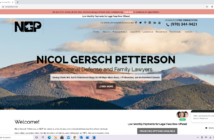Balancing the desire to go narrow with the realities of her locale, this solo has learned which marketing and referral efforts deliver for her business practice.
Nancy Baum Delain has maintained a solo intellectual-property and business-law practice in Clifton Park, New York, for more than 15 years. The key to her success, says Delain, who went into law after a first career as a technical writer, has been taking cases only in the legal niche she loves–and passing on just about everything else.
When clients have asked her to represent them in a criminal case, a real estate deal, or a litigation matter, she has always said, no thanks, but I know a good lawyer who can. “The law like medicine is very, very compartmentalized these days. You don’t go to a brain surgeon to deliver a baby and you don’t go to the obstetrician to do brain surgery,” she observes, offering one explanation for her approach to practicing law. It has also proved to be a great way to build a mutually beneficial referral network with lawyers in other areas of law.
“It works well to try to not be all things to people,” Delain explains. When she declines cases, “people say, ‘Oh, there’s a lawyer turning me away because she doesn’t do that, and she knows she doesn’t do that. Maybe I’ll go back to her when I have something that she is competent in.’ I’ve had that happen.”
Delain started out intending to take nothing but intellectual-property matters, but that niche proved to be a bit too narrow to work, particularly in a smaller market like her town, midway between Schenectady and Albany, the state capital. So she has broadened her practice to include business transactions and bankruptcies. She handles some consumer bankruptcies, but for the most part, she says, “If it is not somehow business-related, it’s not for me.”
The fact that her practice is narrowly focused has always been a key part of her sales pitch. “I present myself to other lawyers as someone who can handle intellectual property matters for their client but I am not looking to steal their client away. I’ll handle a patent issue for them and will happily send the client back.”

Giving and Getting Referrals
To introduce herself to other attorneys when she was starting out, Delain made lots of phone calls. She also actively engaged on the New York State Bar Association general practice listserv. That was a “huge help” in getting her up to speed on practical matters that aren’t taught in law school, “like how to answer the phone and start a case and file a motion–stupid stuff like that.” Over time, she in turn has weighed in with answers to questions posed by others on the listserv, which has helped her make a name for herself. “I have knowledge that many people on that particular listserv don’t have and I’m more than happy to share it,” Delain says.
She also, of course, spread the word about her practice through family and friends, including her long-time doctor who sent Delain her first client, someone he knew who had come up with an invention. “I got the referral, and I got my client a patent on a magnet. It was my very first patent. It went from there.”
Public Speaking and Seminars
Writing and public speaking about intellectual property have also long been a part of her outreach.
She has written about trademarks and patents for the Saratoga Business Journal, among other publications. “Anything helps when you’re getting your name out there, and writing for an established publication in your geographic area helps establish you as an expert in your field … and everyone wants to deal with an expert,” says Delain.
“Of course, the writing must be correct both in terms of subject matter and syntax; you don’t want to put out a badly written or, worse, inaccurate piece! That’s why I always insist that I be allowed to review any piece that gets published about me prior to publication.”
She has also offered seminars such as one on copyright law for startups at a Community Arts Center and another for the Community Loan Fund of the Capital Region, a nonprofit that helps small business obtain financing and other assistance.
“Speaking gets your name out to a lot of people all at once,” says Delain, though it is not for everyone. “Public speaking is an art form, and it’s not one you should engage in unless you’re first comfortable doing so,” she says.
She has “absolutely no qualms about talking in front of a crowd, but many people fear public speaking more than they fear death. If that level of fear describes you, don’t do the public speaking thing until you overcome the fear.”
Do as she did: join Toastmasters and get your public-speaking feet wet before a supportive crowd first. Then, “go for it,” says Delain. Speaking is “a great way to, again, appear as an expert.”
On her website, she has a standing offer of a one-day seminar, one for experienced and another for inexperienced inventors, which takes inventors through the process of obtaining a patent. It is a “perfect fit for your inventors, scientists, engineers, and support staff, covering only the material they need to know about the current state of patent law in the United States,” she says on her website. It is modular in structure and can be customized to suit the specific needs of any particular company or field of business.

Networking at the Chamber of Commerce
Even after 15 years, Delain hasn’t let up on getting her name out there, though she now more carefully picks and choose where to do so. “I don’t get a lot of business out of bar meetings because at this point, most lawyers know who I am and what I do,” she says. “But still it never hurts to show up and say hi and be social and glad-hand and all of that,” she says. “At this point I go where my clients are. I go to the venture capital meetings to meet both venture capitalists and folks with startups.”
The most productive get-togethers for Delain are the Capital Region Chamber of Commerce’s monthly networking events, where there are lots of “bright-eyed entrepreneurs with startups who are looking for a lawyer to help them protect their intellectual property or get a trademark. I very often come out with a new client from those events.”
She has also joined a Chamber subgroup called the Consulting Alliance, made up of professionals who offer specialized instruction and advice to businesses and entrepreneurs. “A lot of the others in the group are human resources guys. There are several lawyers in the group, but I’m the only IP person,” she says.
“The more you can do to get your name out there, the better off you are. If you can get your name out there for free or at low-cost, that’s even better. Every now and again I will take out a Facebook ad, but that expense is mostly just something to write off on taxes at the end of year, if nothing else. Otherwise, I do not advertise and I haven’t needed to,” she says.

Delain is active on LinkedIn, through which she once landed a large client. Her presence on social media otherwise hasn’t directly brought in much work. “But I have made a lot of connections on social media,” she says. “And I have referred a lot of people to other lawyers. It never hurts to be able to refer things to other attorneys because in return they will refer things to you, which is nice.”
Asked whether she would do anything differently if she were starting out now, Delain doesn’t hesitate to reply, “Very little. I did it right. I would probably spend more time going to the various networking events, and I would go to more of them. But I’m perfectly happy with where my practice is at this moment.
“I think it’s important to remember that you can’t be all things to all people,” she adds. “Find an area that you really love and concentrate on that one area, or maybe two. My two are business law including intellectual property and bankruptcy. So the only thing I would say is, do what you love. That’s all.”




